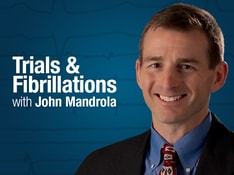To the Editor:
Re: Donald Trump Has Coronary Calcium: Is That Helpful to Know? by John Mandrola, MD
As preventive cardiologists, we have a different take on the utility of coronary artery calcium (CAC) scores in primary prevention.
Knowledge Is Power
We have entered the age of personalized medicine; we can individualize treatment on the basis of disease detection rather than treat all 70-year-olds as if they were the same. The CAC score affords the patient and physician with valuable knowledge regarding the presence or absence of coronary artery disease. Moreover, the CAC score quantifies plaque, allowing us to more precisely determine the patient's specific level of risk. Using calcium scores to guide decision-making regarding medications such as statins and aspirin is based on extensive literature (>2000 published papers related to clinical CAC score use).
There is ample evidence that not all intermediate-risk patients are created equal. CAC equals atherosclerosis, and there is no stronger predictor of cardiovascular events. The American College of Cardiology/American Heart Association Guidelines state: "Assessing CAC is likely to be the most useful of the current approaches to improving risk assessment among individuals found to be at intermediate risk after formal risk assessment."[1] Given the plethora of additional therapies beyond statins now available for prevention of heart attack and stroke (cholesterol-lowering treatments such as PCSK9 inhibitors, ezetimibe, and therapeutic lifestyle changes), doctors can refine their treatments based on CAC results.
Reasons Why It Is Imperative to Use the CAC Score
1. Lowers healthcare costs
Approximately 50% of intermediate-risk patients have CAC scores of zero, meaning there is no detectable plaque. The so-called "Power of Zero" informs patients and their clinicians of a very low risk of the patient experiencing a heart attack within the ensuing 5-10 years. Such knowledge enables physicians to avoid excessive diagnostic testing and therapies that may even harm patients. In the EISNER study,[2] patients were randomly assigned to CAC or no testing, and those found to have zero scores had lower healthcare costs over the ensuing 4 years. This cost savings resulted from the avoidance of unnecessary medications and costly testing. Thus, this simple, low-risk, inexpensive test led to a significant cost savings in the CAC cohort, which represented approximately 50% of intermediate-risk people.
2. Robust reclassification of intermediate-risk patients
In every large study of intermediate-risk patients, the CAC score reclassifies more than 50% of people. That is remarkable, as testing such as C-reactive protein reclassifies 1%-6%. CAC screening appropriately changes the diagnosis in more than half of the people. Yeboah and colleagues,[3] evaluating the intermediate-risk participants of Multi-Ethnic Study of Atherosclerosis (MESA), demonstrated that the net reclassification improvement with CAC was 0.659, meaning that 65.9% of patients were properly reclassified by use of the CAC score.
Examining multiple methods of risk assessment, the study concluded that CAC provided superior discrimination and risk reclassification compared with numerous other commonly used risk markers. Similarly, in the St. Francis Heart Study,[4] 55% of study participants were reclassified (16% to high risk, 39% to low risk). In both the [Heinz Nixdorf] Recall[5] and Rotterdam[6] studies, 52% of intermediate-risk patients were reclassified.
In the most extensive CAC cost-effectiveness study performed, Roberts and colleagues[7] found that CAC testing accurately reclassifies most patients with moderate risk into either lower or higher risk levels. By so doing, CAC often redirects therapy, appropriately aggressively treating only those patients who will most benefit from such preventive strategy. This CAC-based approach is not only more cost-effective, but it is also more robust as it promotes more adherence to prescribed therapies.
3. Individual scores lead to individual treatments
Dr Mandrola (an electrophysiologist) argues in some way that CAC is binary—you either have it or you don't. This outdated perspective is reminiscent of our prior view of high cholesterol and high blood pressure. How wrong we were with that approach! We know better now. CAC, like blood pressure or cholesterol, is not a simple yes or no; it is a continuum that reflects the severity of disease. The higher the number, the greater the risk. Treating President Trump on the basis of his chronological age and saying that he "must have a lot of atherosclerotic disease" would be the same as saying that, based on his age, he "must have high blood pressure" because most men his age do. We don't treat patients without knowing their numbers. We need to know his CAC score, just like we need to know his blood pressure to tailor his treatment (personalized medicine).
While in office, President Clinton was deemed to be so fit that his doctors reportedly stopped his cholesterol-lowering medication. Soon after leaving office, he underwent urgent bypass surgery. His CAC score at the time of surgery was over 1000, an astronomical figure. Had that information been known when he was in office, he would have been treated much differently. One could argue that he might have even been able to avoid his bypass surgery. His "story" was sufficient evidence to convince the doctors who perform executive physicals to add CAC score to the presidential executive physical. Consequently, Presidents Bush, Obama, and Trump have "benefited" from President Clinton's misfortune.
Trump's official medical records disclosed a CAC score of 34 in 2009; the score rose to 98 in 2013 and has now reached 133—far exceeding the minimum score of 100 required to confer high risk, according to an article by CNN Chief Medical Correspondent Dr Sanjay Gupta. A score over 100 indicates a 10-fold risk for future heart attacks, indicating that President Trump's treatment should be intensified. Perhaps the information will instill in him the need to lose weight, exercise more, and allow his physicians to modify his treatment to slow or stop this process, before our oldest elected president suffers any untoward cardiovascular event. We would all be wise to learn from the experiences of our presidents; let's not end up in Clinton's position but rather be proactive with routine CAC testing, as in the case of subsequent presidents.
4. You are never too old to improve your cardiac health
While some have stated that Donald Trump is too old to get a calcium scan, a study by Yano and coworkers[8] included 4778 participants from three US cohorts, with a mean age of 70.1 years. They found that CAC score was superior to age in discriminating between lower and higher coronary heart disease risk in older adults. CAC score was more likely than age to provide higher category-free net reclassification improvement among participants who experienced an atherosclerotic cardiovascular disease (ASCVD) event (0.390; 95% confidence interval [CI], 0.312-0.467 vs 0.08; 95% CI, −0.001 to 0.181) and to result in more accurate reclassification of risk for ASCVD events.
Don't be swayed by the naysayers. The "mammogram of the heart" (calcium scan) is inexpensive, produces similar radiation exposure as a breast mammogram, and will inform you for the next 5 years whether you are, or are not, at increased risk for a heart attack or cardiovascular death. President Clinton didn't get a CAC score while in the White House; he ended up with emergency bypass surgery. President Trump has a moderately elevated score, and now he has the opportunity to potentially avoid a similar fate. Driving cholesterol levels lower, gaining control of blood pressure, and maximizing diet and exercise can help all patients avoid the number-one killer in America (heart disease) and the number-three killer (stroke). CAC testing is a small price to pay for a mountain of personal knowledge that can appropriately motivate our patients to live healthier lives.[9]
Any views expressed above are the author's own and do not necessarily reflect the views of WebMD or Medscape.
Cite this: Why Donald Trump Is Better Off Knowing His Calcium Score - Medscape - Mar 19, 2018.














Comments